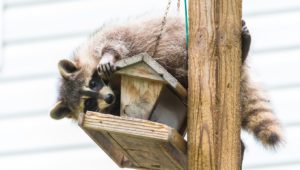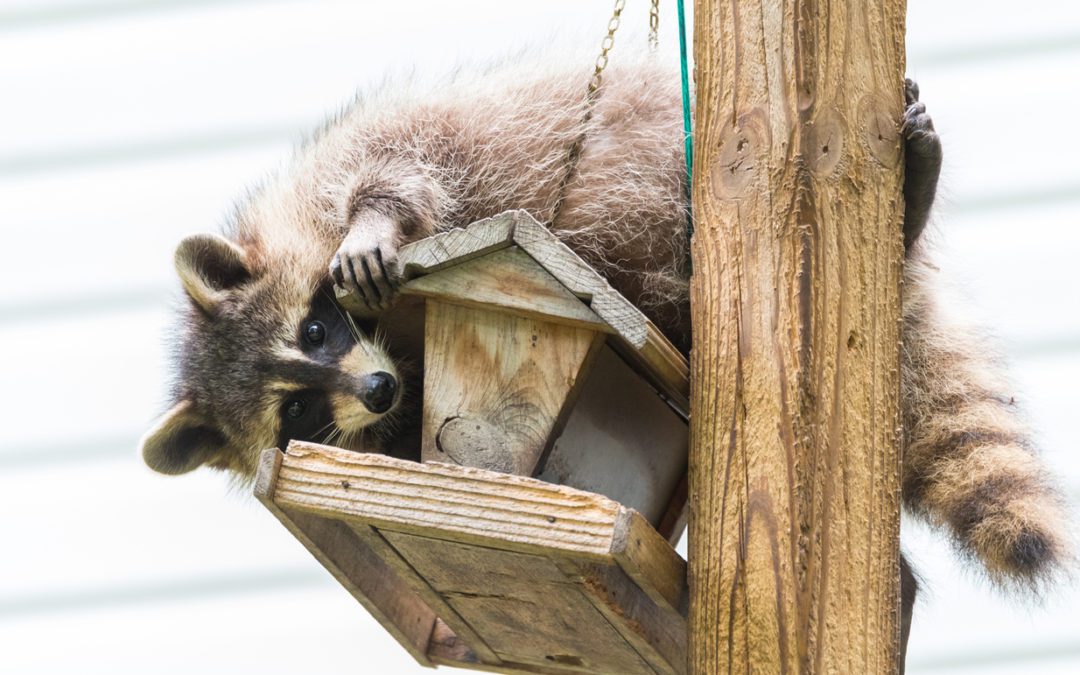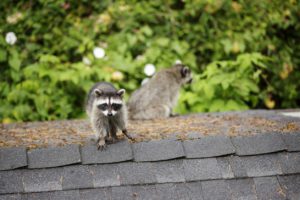As I’ve mentioned in the past, when I write these blogs, I try my best to cover topics that you, the reader, are genuinely curious about. I was somewhat surprised to find that an overwhelming number of you want to know about raccoon repellent. What kinds of repellents are out there, and what works best? Well, if you had asked my grandmother, she would have told you that playing mariachi music for 24 hours straight will drive raccoons out (I am not making this up). I’d like to point out that playing mariachi music for 24 hours straight will probably drive just about anyone out, but I digress.
ABC Wildlife is a company that stands strongly behind structural exclusion and natural habitat modification to deter invasive wildlife, but I went ahead and
Ammonia and Mothballs
Many people believe that placing mothballs and rags soaked with ammonia in an animal burrow will repel them. The theory is that the smell is so abhorrent to wildlife, it will cause them to turn tail and run. Does this work? Well, think of it this way: if something smelly was in your house, would you pack up and move to a new house? No, you’d simply throw it away. Just like humans, raccoons have two hands, and if they find something in their living environment that they don’t like, they’ll pick it up and toss it out.
Ultrasonic Noise Machines
These small boxes emit ultrasonic sounds that are supposed to repel raccoons, mice, and even insects. Sound too good to be true? That’s because it is! These devices are so unsuccessful that the Federal Trade Commission has brought law enforcement actions against several manufacturers for fraudulently claiming their effectiveness. Animals, especially raccoons, are adaptable, and while a particular sound might give them pause at first, it doesn’t take long for them to become accustomed to it.
Sprays and Granules
I found several sprays and granules that can be applied around the perimeter of one’s property or directly to the area where the raccoon is living. These products contain substances like predator urine and are supposed to make raccoons believe danger is near. If you take a look at this study published in Behavioral Ecology: Oxford Journals, you’ll see that applying coyote urine near raccoon lures actually resulted in attracting MORE raccoons. So there you go. Theory debunked. But, let’s just say for giggles that sprays and granules do work as a raccoon repellent. These substances wash away easily, and you would still have to reapply every time it rained or snowed, which just isn’t a practical long-term solution.
Capsaicin
Now here is something that actually works…as long as you’re dealing with an animal chewing on your house. Capsaicin is the active component in peppers that makes them hot, and mammal taste receptors are especially sensitive to it. If you’ve got squirrels, mice, or some other variety of animal that likes to gnaw a specific area of your home, capsaicin is great. But raccoons aren’t likely to chew on a structure. What about applying it to a pipe or downspout where they’re climbing? Won’t that burn their paws and keep them from using it as an access point? Yes, possibly, but raccoons are smart cookies and good at problem solving. What’s far more likely to happen is that the raccoons will simply find a different area of the house to climb.
Raccoon Repellent That Works
Okay, Karen, you’ve told me what doesn’t work. So what should I use to keep raccoons away? I’m so glad you asked! Here’s the bottom line: if raccoons can’t find food or shelter on your property, they’re going to move right along and not give it another glance. Here are some ways to accomplish this:
Sanitation
Make sure your trashcans can’t be knocked over by keeping them in a frame. Purchase garbage bins you can fasten shut, or secure the lids with bungee cords. Don’t leave any kind of food outside. Clean up if you have a party or picnic, remove birdfeeders, and keep your pet food dishes indoors.
Treat Your Lawn For Grubs
Raccoons love insect grubs, and they’ll tear up lawns looking for them. If you apply de-grubbing treatments to your lawn, this will eliminate one more food source for raccoons. And an added bonus, it’ll also help keep skunks away.
Repair Damage to Roof and Soffits
Raccoons (and squirrels) will target areas of roofs and soffits that are weakened by rot or water damage. The easier it is for them to tear through the wood, the faster they’ll be in your attic.
Animal-Proof Your House
Attic vents are designed to let air in and out, but they are definitely not designed to withstand raccoons. Raccoons are very strong and often bend and mangle roof vents until they can fit through them. ABC Wildlife installs animal-proof vent covers and chimney caps for this very reason. This is truly one of the most effective and long lasting measures you can take to protect your house.
I hope this blog clears up some of the myths surrounding raccoon repellent and gives you useful tools for keeping them away from your home. And if you already have raccoons living on your property, fear not. ABC Wildlife has 40 years of experience dealing with raccoons, and we are happy to help. Whether you need an animal removed or just have questions, our representatives are ready to put their state certifications to good use. We love solving wildlife problems and are eager to talk to you today. Give us a call at (847) 870-7175.
Sharing is caring! If you’ve learned something from what you’ve read, please click one of the icons below to share this post on social media.
Karen Jesse is a wildlife writer and educator licensed by the Illinois Department of Natural Resources and the Illinois Department of Public Health in urban wildlife management and structural pest control. She enjoys hiking, telling people how cool skunks are, and opera.





